八年级上册知识点击Unit2Topic2
仁爱版八年级上册英语-Unit2:Topic2单词汇总+知识梳理
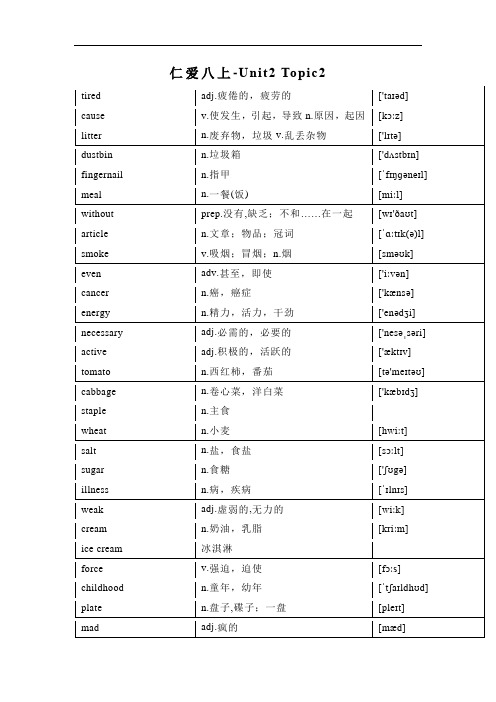
仁爱八上-Unit2 Topic2知识梳理【重点短语】1.stay up late 熬夜到很晚2.do morning exercises 做早操3.throw litter around 到处乱扔垃圾4.read in the sun 在太阳下读书5.in the newspaper在报纸上6.give up doing sth.7.show sth. to sb.=show sb. sth.8.It’s +adj.+ for sb. to do sth.对某人来说做某事……9.be careful not to do sth.小心不要做某事10.force sb. to do sth.迫使某人做某事11.leave for sp. 前往某地12.as soon as…一……就……13.get/be mad 发疯14.be surprised to do sth. 惊奇于做某事15.in fact 事实上16.as soon as possible 尽可能快的【重点句型】1.Staying up late is bad for your health.熬夜到很晚对你的健康有害。
2.I must have a good rest.我一定要好好休息。
3.You’d better not read in the sun.你最好不要在太阳下读书。
4.I must ask him to give up smoking.我一定让他放弃抽烟。
5.He thinks smoking can help him relax.他认为抽烟可以帮他放松。
6.It may even cause cancer.它甚至导致癌症。
7.May I borrow your newspaper and show it to my father? 我可以借你的报纸给我爸爸看看吗?8.How terrible!多么糟糕呀!9.It’s bad for your health.这对你健康有害。
仁爱英语八年级上Unit 2 Topic 2知识点讲解与练习

Topic 2 I must ask him to give up smoking.一、词组与短语。
1. 熬夜,不睡觉______________2. 对……有害_______________2. make a conversation___________ 4.吃了一顿丰盛的晚餐______5. 服一些药______________6.做早操________________7.留长指甲_______________ 8.play sports ______________9. without breakfast ___________ 10.have a bath ____________11.take a fresh breath __________ 12.read in the sun __________13.give up ______________ 14.show…to…15.到处乱扔_____________ 16.on the lawn _____________17.be necessary for __________ 18. during the day__________19.on an empty stomach_________ 20.get into ________________21.human body ______________ 22.have an illness _________23.keep away from __________ 24.spit in public __________24.整理房间______________ 25.扫地_____________26.as we know ____________ 28.in different ways _________29. have the right kinds of food ______________________30.become sick ____________ 31.less than two hours ______32. three to five days _________ 33.more than ten hours _______二、重点句型1.什么引起这种疾病?_______ _______ the desease?2.熬夜对你的身体有害。
初二上 Unit2 topic 2 知识点
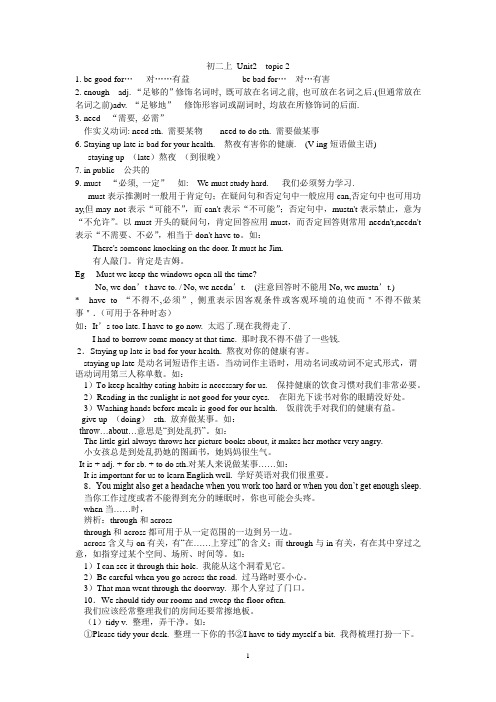
初二上Unit2 topic 21. be good for…对……有益be bad for…对…有害2. enough adj. “足够的”修饰名词时, 既可放在名词之前, 也可放在名词之后.(但通常放在名词之前)adv. “足够地”修饰形容词或副词时, 均放在所修饰词的后面.3. need “需要, 必需”作实义动词: need sth. 需要某物need to do sth. 需要做某事6. Staying up late is bad for your health. 熬夜有害你的健康. (V-ing短语做主语)staying up (late)熬夜(到很晚)7. in public 公共的9. must “必须, 一定”如: We must study hard. 我们必须努力学习.must表示推测时一般用于肯定句;在疑问句和否定句中一般应用can,否定句中也可用功ay,但may not表示“可能不”,而can't表示“不可能”;否定句中,mustn't表示禁止,意为“不允许”。
以must开头的疑问句,肯定回答应用must,而否定回答则常用needn't,needn't 表示“不需要、不必”,相当于don't have to。
如:There's someone knocking on the door. It must he Jim.有人敲门。
肯定是吉姆。
Eg -Must we keep the windows open all the time?-No, we don’t have to. / No, we needn’t. (注意回答时不能用No, we mustn’t.)* have to “不得不,必须”, 侧重表示因客观条件或客观环境的迫使而"不得不做某事".(可用于各种时态)如:It’s too late. I have to go now. 太迟了.现在我得走了.I had to borrow some money at that time. 那时我不得不借了一些钱.2.Staying up late is bad for your health. 熬夜对你的健康有害。
Unit 2 Topic 2知识梳理仁爱版英语八年级上册
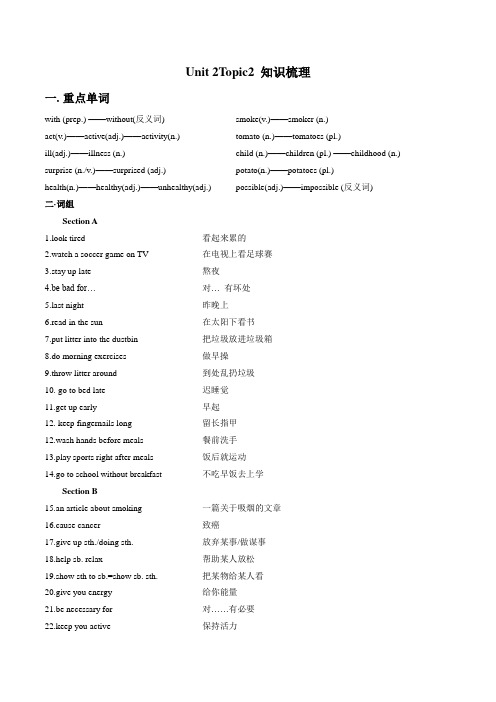
Unit 2Topic2 知识梳理一.重点单词with (prep.) ——without(反义词) smoke(v.)——smoker (n.)act(v.)——active(adj.)——activity(n.) tomato (n.)——tomatoes (pl.)ill(adj.)——illness (n.) child (n.)——children (pl.) ——childhood (n.) surprise (n./v.)——surprised (adj.) potato(n.)——potatoes (pl.)health(n.)——healthy(adj.)——unhealthy(adj.) possible(adj.)——impossible (反义词) 二·词组Section A1.look tired 看起来累的2.watch a soccer game on TV 在电视上看足球赛3.stay up late 熬夜4.be bad for… 对… 有坏处st night 昨晚上6.read in the sun 在太阳下看书7.put litter into the dustbin 把垃圾放进垃圾箱8.do morning exercises 做早操9.throw litter around 到处乱扔垃圾10. go to bed late 迟睡觉11.get up early 早起12. keep fingernails long 留长指甲12.wash hands before meals 餐前洗手13.play sports right after meals 饭后就运动14.go to school without breakfast 不吃早饭去上学Section B15.an article about smoking 一篇关于吸烟的文章16.cause cancer 致癌17.give up sth./doing sth. 放弃某事/做谋事18.help sb. relax 帮助某人放松19.show sth to sb.=show sb. sth. 把某物给某人看20.give you energy 给你能量21.be necessary for 对……有必要22.keep you active 保持活力23.take a walk 散步Section C24.be careful (not) to do sth… 小心(不)要做做谋事25.cause illness/diseases 引发疾病26.take care of sb. well= take good care of sb.照顾好某人27.force sb. to do sth. 强迫某人做谋事28.during one’s childhood 在某人童年时期29.make sb. do sth. 使某人做谋事30.get mad 生气31.be surprised to do sth. 做谋事感到很吃惊32.as soon as… 一…就…33.during his childhood 在他的童年期间34.by chance 偶然地Section D35.as soon as possible 尽快36.not only… but (also)… 不仅…而且…37.tell sb. (not) to do sth. 告诉某人(不)要做谋事38.in fact 实际上,事实上三.重点句子1. I’m sorry to hear that. 听到这个我感到很抱歉。
仁爱英语八年级上unit 2 topic 2知识点归纳

本文由一线教师精心整理/word可编辑八年级上册Unit 2 topic 2I must ask him to give up smoking.Section A※重点短语集锦1.look tired 看起来很累2.watch a soccer game on TV在电视上观看一场足球赛3.stay up ( late ) 熬夜4.go to bed late 晚睡5.be bad/good for…对……有害/益6.do morning/eye exercises 做早操/眼保健操7.do exercise=do/play sports 做运动/锻炼8.Put into 投入9.throw around 乱扔10. keep fingernails long 留长指甲11. play sports right 进行适当的体育锻炼12. go to school without breakfast不吃早餐去上学※重要知识点讲解1. What’s wrong? = What’s up?= What’s happening ? = What’s the matter/trouble? 怎么了?2. Staying up late is bad for your health.(1) stay up = sit up熬夜, 如:we stayed up until midnight to see the New Year coming.(2) 动词ing形式(动名词)可直接放句首作主语,谓语动词用单三形式。
3.I am sorry to hear that.听到这我感到很难过。
这是表示同情的一种说法。
当你听到别人不幸的事情时,应说此句用来表示你的同情。
4.on TV/the phone“(通过)电视/电话”,或直接译成“在电视上/电话上”。
5.I see.我明白了。
此句为口语,在这里see指“明白,理解”之意。
仁爱英语八年级上册Unit2-topic2知识点总结
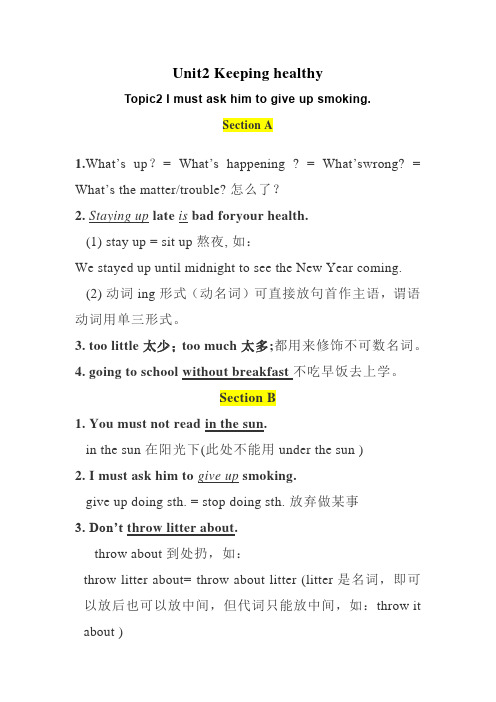
Unit2 Keeping healthyTopic2 I must ask him to give up smoking.Section A1.What’s up?= What’s happening ? = What’swrong? = What’s the matter/trouble? 怎么了?2. Staying up late is bad foryour health.(1) stay up = sit up熬夜, 如:We stayed up until midnight to see the New Year coming. (2) 动词ing形式(动名词)可直接放句首作主语,谓语动词用单三形式。
3. too little 太少; too much 太多;都用来修饰不可数名词。
4. going to school without breakfast 不吃早饭去上学。
Section B1. You must not read in the sun.in the sun 在阳光下(此处不能用under the sun )2. I must ask him to give up smoking.give up doing sth. = stop doing sth. 放弃做某事3. Don’t throw litter about.throw about 到处扔,如:throw litter about= throw about litter (litter是名词,即可以放后也可以放中间,但代词只能放中间,如:throw it about )4. go for a walk 去散步; take a walk = have a walk 散步5. It will keep you active during the day.(1)keep + 宾语+ 补语(补语可以是:动词ing 形式;形容词;介词短语)①I’m sorry to keep you waiting for sucha long time. (keep sb. doing sth.使某人一直做某事 )②Keep the door open, please. (keep sb/sth+形容词表示某人/某事物保持怎样的状态)③Once a cold keep the child in bed forthree days (keep sb+介词短语表示某人呆在某地)(2) during the day = in the daytime 在白天Section C1. It may show that something is wrongwith your health.(1) show sb. sth. = show sth. to sb. 向某人展示某物 please show me your new book.(2) show sb. around 某地表带某人参观某地:I’ll show you around our schooltomorrow.2. You can get a headache when you exercise onan empty stomach.on an empty stomach 空腹3. We can get into the human body throughthe nose.(1) get into 进入,陷入; 如:get into trouble 陷入麻烦(2)①through 从物体内部穿过,如:walk through a forest.②across 从物体表面横穿,如:go across the road③ over 从物体上空越过, 如:fly over the city4. The boy has an illness.illness = sickness疾病(名词),很少表示具体的疾病,只表示抽象的疾病,disease 常表某种疾病。
仁爱版英语八年级上册八上 Unit 2 Topic 2 必背词句
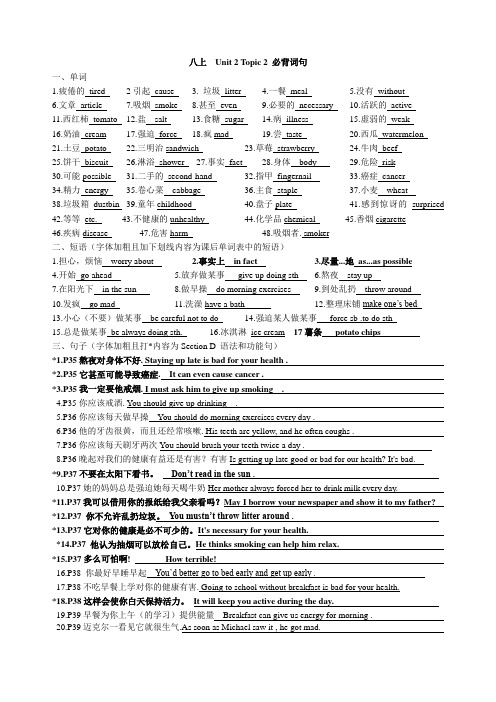
八上Unit 2 Topic 2 必背词句一、单词1.疲倦的tired 2引起cause 3. 垃圾litter 4.一餐meal 5.没有without6.文章article7.吸烟smoke8.甚至even9.必要的necessary 10.活跃的active11.西红柿tomato 12.盐salt 13.食糖sugar 14.病illness 15.虚弱的weak16.奶油cream 17.强迫force 18.疯mad 19.尝taste 20.西瓜watermelon 21.土豆potato 22.三明治sandwich 23.草莓strawberry 24.牛肉beef25.饼干biscuit 26.淋浴shower 27.事实fact 28.身体body 29.危险risk30.可能possible 31.二手的second-hand 32.指甲fingernail 33.癌症cancer34.精力energy 35.卷心菜cabbage 36.主食staple 37.小麦wheat38.垃圾箱dustbin 39.童年childhood 40.盘子plate 41.感到惊讶的surprised 42.等等etc. 43.不健康的unhealthy 44.化学品chemical 45.香烟cigarette46.疾病disease 47.危害harm 48.吸烟者. smoker二、短语(字体加粗且加下划线内容为课后单词表中的短语)1.担心,烦恼worry about2.事实上in fact3.尽量...地as...as possible4.开始go ahead5.放弃做某事give up doing sth6.熬夜stay up7.在阳光下in the sun 8.做早操do morning exercises 9.到处乱扔throw around10.发疯go mad 11.洗澡have a bath 12.整理床铺make one’s bed13.小心(不要)做某事be careful not to do 14.强迫某人做某事force sb .to do sth15.总是做某事be always doing sth. 16.冰淇淋ice cream 17薯条potato chips三、句子(字体加粗且打*内容为Section D 语法和功能句)*1.P35熬夜对身体不好. Staying up late is bad for your health .*2.P35它甚至可能导致癌症. It can even cause cancer .*3.P35我一定要他戒烟. I must ask him to give up smoking .4.P35你应该戒酒. You should give up drinking .5.P36你应该每天做早操You should do morning exercises every day .6.P36他的牙齿很黄,而且还经常咳嗽. His teeth are yellow, and he often coughs .7.P36你应该每天刷牙两次You should brush your teeth twice a day .8.P36晚起对我们的健康有益还是有害?有害Is getting up late good or bad for our health? It's bad.*9.P37不要在太阳下看书。
仁爱英语八年级上Unit2.topic2知识点归纳
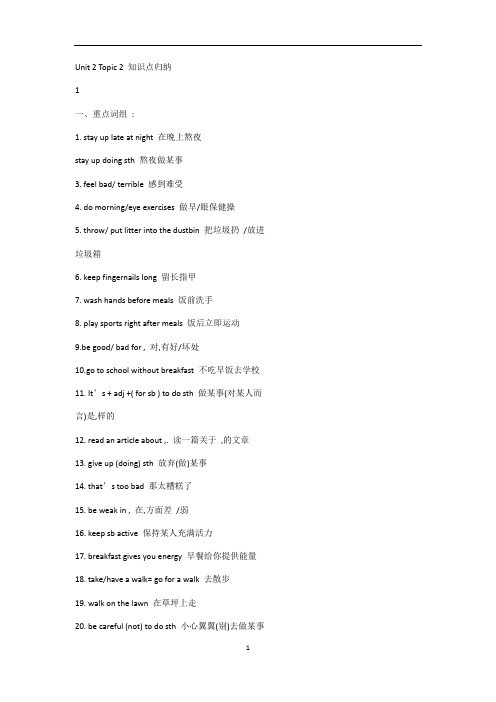
Unit 2 Topic 2 知识点归纳1一、重点词组:1. stay up late at night 在晚上熬夜stay up doing sth 熬夜做某事3. feel bad/ terrible 感到难受4. do morning/eye exercises 做早/眼保健操5. throw/ put litter into the dustbin 把垃圾扔/放进垃圾箱6. keep fingernails long 留长指甲7. wash hands before meals 饭前洗手8. play sports right after meals 饭后立即运动9.be good/ bad for , 对,有好/坏处10.go to school without breakfast 不吃早饭去学校11. It’s + adj +( for sb ) to do sth 做某事(对某人而言)是,样的12. read an article about ,. 读一篇关于,的文章13. give up (doing) sth 放弃(做)某事14. that’s too bad 那太糟糕了15. be weak in , 在,方面差/弱16. keep sb active 保持某人充满活力17. breakfast gives you energy 早餐给你提供能量18. take/have a walk= go for a walk 去散步19. walk on the lawn 在草坪上走20. be careful (not) to do sth 小心翼翼(别)去做某事21. force sb to do sth 强迫某人做某事22. as soon as 一,就, .23. during one’s childhood 在某人童年24. get mad 生气,变疯25. be always doing sth 总是做某事26. to one’s surprise 令某人吃惊的是be surprised to do sth 惊奇地做某事be surprised at sht 对某事感到惊讶e sth to do sth= use sth for doing sth利用, .做,.28. as,as possible= as, as one can 尽可能的, .as soon/much as possible 尽可能快/多29. drink sour milk 喝变质牛奶30.tidy one’s room 整理房间31. make one’s bed 整理床铺32. spit everywhere/in public 到处/在公共场合吐痰33. as we (all) know众所周知34. help sb relax 帮助某人放松35. in fact 事实上,实际上36. not only , but (also), 不仅,而且, .37.during the day= in the daytime 在白天38. make sb do sth 使某人做某事39. cause cancer 引发癌症40. in the newspaper 在报纸上二、必背重点句型1.Staying up late is bad for your health. 熬夜对你的健康有害. (动名词短语做主语,谓语动词用三人称单数)2.Is going to bed early good or bad for your health? It’s good.早点睡觉对你的健康有益还是有害? 有益. (选择问句要根据事实回答)3.It will keep you active in the daytime.它(早睡早起)将使你在白天保持旺盛的精力.4.You must not throw litter about.= Don’t throw litter about. 不要乱扔垃圾.5.The article says smoking is bad for our lungs. 文章上说吸烟对我们的肺有害6. I must ask him to give up smoking.我必须叫他戒烟。
Unit 2 Topic 2 ---3重难点知识归纳总结2021-2022学年仁爱版英语八年级上册
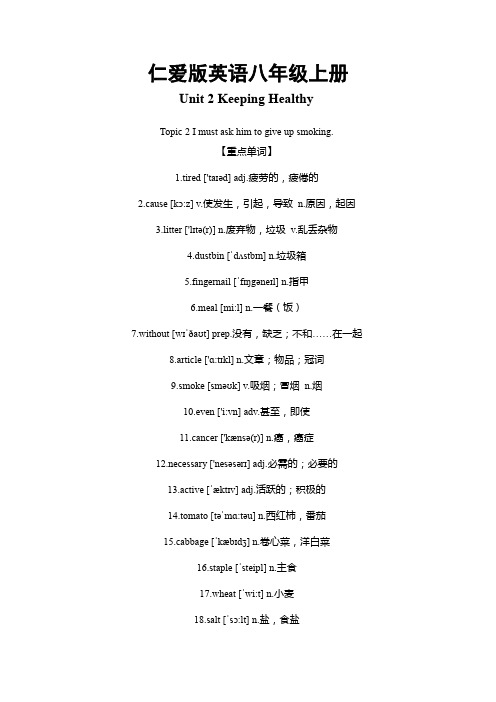
仁爱版英语八年级上册Unit 2 Keeping HealthyTopic 2 I must ask him to give up smoking.【重点单词】1.tired ['taɪəd] adj.疲劳的,疲倦的2.cause [kɔ:z] v.使发生,引起,导致n.原因,起因3.litter ['lɪtə(r)] n.废弃物,垃圾v.乱丢杂物4.dustbin [ˈdʌstbɪn] n.垃圾箱5.fingernail [ˈfɪŋgəneɪl] n.指甲6.meal [mi:l] n.一餐(饭)7.without [wɪˈðaʊt] prep.没有,缺乏;不和……在一起8.article ['ɑ:tɪkl] n.文章;物品;冠词9.smoke [sməʊk] v.吸烟;冒烟n.烟10.even ['i:vn] adv.甚至,即使11.cancer ['kænsə(r)] n.癌,癌症12.necessary ['nesəsərɪ] adj.必需的;必要的13.active [ˈæktɪv] adj.活跃的;积极的14.tomato [təˈmɑ:təu] n.西红柿,番茄15.cabbage [ˈkæbɪdʒ] n.卷心菜,洋白菜16.staple [ˈsteipl] n.主食17.wheat [ˈwi:t] n.小麦18.salt [ˈsɔ:lt] n.盐,食盐19.sugar [ˈʃugə] n.食糖20.illness [ˈɪlnəs] n.疾,疾病21.weak [wi:k] n.虚弱的,无力的22.cream [kri:m] n.奶油,乳脂23.ice cream 冰淇淋24.force [fɔ:s] v.强迫,迫使25.childhood [tʃaildhud] n.童年,幼年26.plate [pleɪt] n.盘子,碟子;一盘27.mad [maid] adj.疯的28.taste [teɪst] v.尝,品;吃n.味道29.surprise [səˈpraɪz] v.使惊奇,使诧异n.惊奇,惊讶30.watermelon [ˈwɔ:təmelən] n.西瓜31.potato [pəˈteɪtəʊ] n.土豆,马铃薯32.sandwich ['sænwɪdʒ] n.三明治(夹心面包片)33.strawberry ['strɔ:bərɪ] n.草莓34.beef [bi:f] n.牛肉35.biscuit [biskit] n.饼干36.such [sʌtʃ] pron.这样的,那样的,类似的37.etc [etsetərə] abbr.等等,以及其他38.fact [fækt] n.事实,真相;现实39.unhealthy [ʌn'helθɪ] adj.不健康的40.chemical [kemikl] n.化学品41.cigarette [sigəret] n.香烟,纸烟42.body ['bɒdɪ] n.身体43.disease [dɪˈzi:z] n.病,疾病44.harm [ha:m] v.&n.危害,伤害,损害45.smoker [sməʊkə] n.吸烟者46.second-hand adj. 二手的,旧的47.risk [risk] n.危险,风险v.(使)冒……的风险48.possible [pɔsəbl] adj.可能;能做到【重点短语】1.in fact 事实上,实际上2.as... as possible 尽量……地3.give up 放弃4.stay up late 熬夜5.be bad for 对……有害6.put... into... 把……放进……7.get up 起床8.be good for 有利于9.take a walk 散步10.have a bath 沐浴11.force sb to do sth 强迫某人做某事12.leave for 动身去,出发前往【重点句型】1.Staying up late is bad for your health. 熬夜对你的健康有害。
仁爱版英语八年级上册知识点汇总(Unit1-2)

仁爱版英语八年级上册知识点汇总(U n i t1-2)本页仅作为文档页封面,使用时可以删除This document is for reference only-rar21year.March仁爱版英语八年级上册知识点汇总(Unit1~2)Unit1 Playing SportsTopic1 I’m going to play basketball.【重点短语】1. during the summer holidays在暑假期间2. between…and…在两者之间3. cheer sb. on为某人加油4. prefer doing sth.更喜欢做某事5. quite a bit/a lot很多6. plan to do sth.计划做某事7. have a skating club举办滑雪俱乐部8. go skating/skiing/bicycling/climbing/hiking去滑雪/滑冰/骑车/爬山/远足9. arrive in/at到达10. play against…与……对抗/较量11. for long很久12. leave for…动身去…13. the day after tomorrow后天14. China’s national team中国国家队15. play baseball打棒球16. at least至少17. What a shame! 多羞愧!18. be good at善于做某事19. take part in参加20. all over the world全世界21. be good for对……有益22. a good way一种好方法23. keep fit/healthy保持健康24. relax oneself放松某人自己【重点句型】1. What’s your favorite sport?= What sport do you like best?你最喜爱的运动是什么?2. Which sport do you prefer?= Which sport do you like better?你更喜欢什么运动?I prefer skating.= I like skating better.我更喜欢滑雪.3. Do you skate much?= Do you often skate?你常滑雪吗?4. She spends at least half an hour in the gym every day. 每天她至少花半小时在体育馆.5. She plays baseball pretty well and she is also good at jumping. 她棒球打得相当好而且擅长于跳.6. What kind of sports do you like = Which sport do you like 你喜欢哪种运动7. Would you like to come and cheer us on 你愿意来为我们加油吗8. What are you going to be when you grow up 当你长大后做什么9. There is going to be a school sports meet next month.下月有一场运动会。
八年级上册unit2知识要点
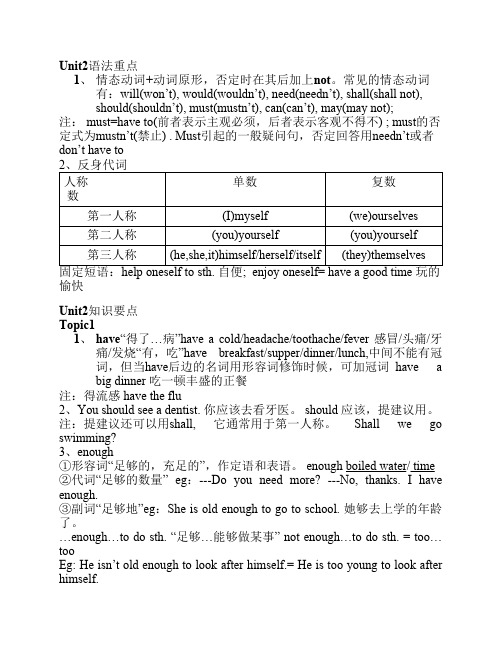
动词作主语时要变成动名词或者是动词不定式,谓语动词用单数形式。
2、 before meals 饭前; after meals 饭后; after dinner 晚饭后
(主将从现)
eg: We will return to school as soon as the summer holiday is over.
11、 be surprised to do “对…感到惊讶” I was surprised to hear the
news.
12、 keep后接形容词/动名词表示“让某人/某物处于某种状态”。如:
去做
3、prevent/keep/stop “阻止/阻挠…做某事” keep/stay away from… 远 离… 4、ring sb. up = call sb. up = give sb. a call/call sb. 打电话 5、leave a message (to sb.) 留口信take a message for sb.=give sb. a message 捎口信
注: must=have to(前者表示主观必须,后者表示客观不得不) ; must的否 定式为mustn’t(禁止) . Must引起的一般疑问句,否定回答用needn’t或者 don’t have to 2、反身代词
人称 数
f
(we)ourselves
第二人称
(you)yourself
②作名词:原因,起因(可数);理由,缘故(不可数)
eg:Drunk driving is one of the most common causes of traffic accidents.
八年级上册英语u2t2知识点
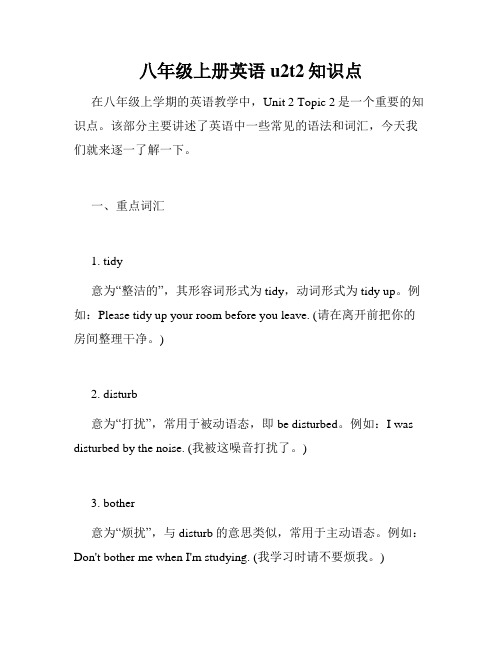
八年级上册英语u2t2知识点在八年级上学期的英语教学中,Unit 2 Topic 2是一个重要的知识点。
该部分主要讲述了英语中一些常见的语法和词汇,今天我们就来逐一了解一下。
一、重点词汇1. tidy意为“整洁的”,其形容词形式为tidy,动词形式为tidy up。
例如:Please tidy up your room before you leave. (请在离开前把你的房间整理干净。
)2. disturb意为“打扰”,常用于被动语态,即be disturbed。
例如:I was disturbed by the noise. (我被这噪音打扰了。
)3. bother意为“烦扰”,与disturb的意思类似,常用于主动语态。
例如:Don't bother me when I'm studying. (我学习时请不要烦我。
)4. organize意为“组织,整理”,其名词形式为organization。
例如:We need to organize a party for our class. (我们需要为我们的班级组织一次派对。
)5. laundry意为“洗衣房,洗好的衣服”,其动词形式为wash。
例如:Can you help me with the laundry? (你能帮我洗衣服吗?)二、重点语法1. there be句型该句型表示“某处有某物或某人”的意思。
例如:There is a cat on the table. (桌子上有一只猫。
) 在这个句型中,谓语动词be应与后面的名词或代词保持一致。
2. 疑问句的转换将陈述句转换成一般疑问句时,需要在句首加do或does (主语为第三人称单数),将句子结尾的句点改成问号。
例如:You have a book. (你有一本书。
) → Do you have a book? (你有书吗?)将陈述句转换成特殊疑问句时,需要把疑问词放在句首,其余部分的顺序不变。
八年级上册英语第二单元topic2知识点

八年级上册英语第二单元topic2知识点在八年级上册英语第二单元topic2中,我们主要学习了关于时间、日期、兴趣爱好和日程安排等方面的英语知识。
以下是本单元重点内容的详细介绍:一、时间和日期在本单元中,我们学习了如何用英语表达时间和日期。
其中,时间的表示方法有两种:12小时制和24小时制。
举个例子,如果要表达早上8点钟,我们可以说“eight o'clock in the morning”或者“eight in the morning”,其中“o'clock”表示“点钟”,“in the morning”表示“在早上”。
而要表达日期,我们可以用“month/day/year”的格式,比如“12/25/2019”表示“2019年12月25日”。
二、兴趣爱好本单元中,我们还学习了有关兴趣爱好的相关词汇和表达方式。
比如,我们可以用“I like…”或者“I am interested in…”来表达自己的兴趣爱好,并且可以搭配不同的名词或动词来丰富表达。
例如,“I like playing basketball”,“I am interested in reading novels”。
三、日程安排在日常生活中,我们经常需要制定并安排自己的日程。
在本单元中,我们学习了如何用英语表达日程安排。
比如,我们可以说“On Monday, I have English class in the morning and math class in the afternoon”,或者“今天下午我要参加一场会议”可以说成“I have a meeting this afternoon”。
除了以上几点,还有一些其他的知识点,在课堂上老师会给出一些练习题目来帮助我们巩固所学的知识点。
通过这些练习,我们可以更好地掌握英语中关于时间、日期、兴趣爱好和日程安排等方面的表达方式,提高自己的英语口语水平。
总之,本单元的重点内容涵盖了时间、日期、兴趣爱好和日程安排等多个方面,这些都是日常生活中必不可少的部分。
仁爱英语八年级上册第二单元unit2 topic 2 课文知识点讲解
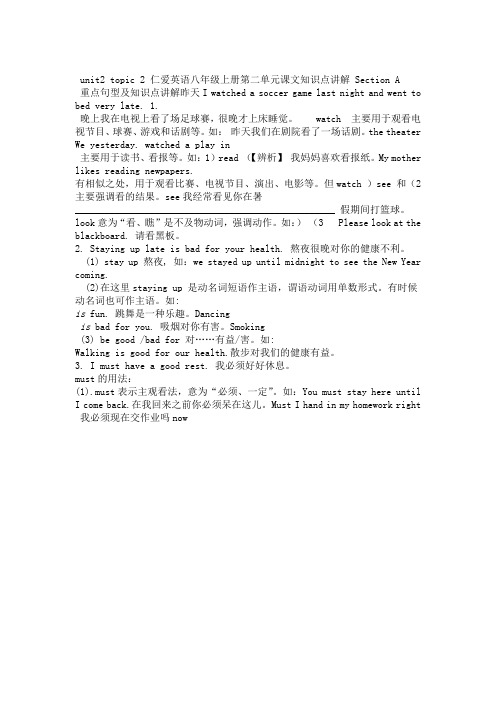
unit2 topic 2 仁爱英语八年级上册第二单元课文知识点讲解Section A重点句型及知识点讲解昨天I watched a soccer game last night and went to bed very late. 1.晚上我在电视上看了场足球赛,很晚才上床睡觉。
watch 主要用于观看电视节目、球赛、游戏和话剧等。
如:昨天我们在剧院看了一场话剧。
the theater We yesterday. watched a play in主要用于读书、看报等。
如:1)read (【辨析】我妈妈喜欢看报纸。
My mother likes reading newpapers.有相似之处,用于观看比赛、电视节目、演出、电影等。
但watch )see 和(2主要强调看的结果。
see我经常看见你在暑____________________________________________________假期间打篮球。
look意为“看、瞧”是不及物动词,强调动作。
如:)(3 Please look at the blackboard. 请看黑板。
2. Staying up late is bad for your health. 熬夜很晚对你的健康不利。
(1) stay up 熬夜, 如:we stayed up until midnight to see the New Year coming.(2)在这里staying up 是动名词短语作主语,谓语动词用单数形式。
有时候动名词也可作主语。
如:is fun. 跳舞是一种乐趣。
Dancingis bad for you. 吸烟对你有害。
Smoking(3) be good /bad for 对……有益/害。
如:Walking is good for our health.散步对我们的健康有益。
3. I must have a good rest. 我必须好好休息。
八年级上Unit 2 Topic 2.单词、词组和句型

八年级上Unit 2 Topic 1Section A(1) 单词:牙痛_________ 牙科医生_________ 咳嗽________头疼_________ 发烧_________ 流行感冒________胃疼_________ 咖啡________ 茶;茶叶_________大量,充足_________ 烧开________ 电梯;举起_________ (2) 词组:患感冒___________________ 患重感冒____________________在夜晚_________________ 大量,丰富________________开水______________ 康复______________________看医生_____________ 休息____________________(3) 重点句型:①你怎么了?_____________________________________________________②我很抱歉听到这消息。
_____________________________________________________③你应该去看医生。
_____________________________________________________④希望你快快康复。
_____________________________________________________①你患重感冒了?我很抱歉听到这个消息。
__________________________? __________________________.②你晚上不应该喝茶。
You _____________________________.③她看医生之后就好了。
She________________ after she __________________________.④每天我们都应该喝大量的开水。
八年级上册Unit2知识点归纳

八年级上册Unit2知识点归纳八年级上册的Unit2主要涵盖了一些英语语法和词汇知识,包括时态、动词不定式、情态动词、名词和形容词等方面。
下文将对这些知识点进行归纳总结,以帮助学生更好地掌握这些重要的英语知识点。
1. 时态在Unit2中,时态是一个重要的语法知识点。
本单元重点介绍了现在进行时和一般现在时两种时态。
一般现在时(Simple Present Tense):表示现在或经常性的习惯性动作。
例如:- I usually go to school by bike.(我通常骑自行车去学校。
)- He often reads books in the library.(他经常在图书馆里看书。
)现在进行时(Present Continuous Tense):表示现在正在进行的动作。
例如:- She is watching TV now.(她现在正在看电视。
)- What are you doing?(你在做什么?)2. 动词不定式动词不定式(Infinitive)是一个非常常见的语法知识点,也是本单元的重点。
动词不定式用来表示目的、意愿、建议和能力等。
例如:- I want to go to the movies.(我想去看电影。
)- He can speak Chinese very well.(他可以很好地说中文。
)需要注意的是,动词不定式有时需要加上to或省略to,具体要根据上下文和语境进行判断。
3. 情态动词情态动词(Modal Verbs)是指can、may、must、shall、will等一系列动词,用来表达说话人的态度或能力。
在Unit2中,重点介绍了can、may、must和should这四个情态动词。
can:表示能力。
例如:- We can swim in the river.(我们可以在河里游泳。
)may:表示可能性。
例如:- It may rain tomorrow.(明天可能会下雨。
仁爱版英语八年级上Unit1--Unit2知识点总结

Unit1 topic1重点词组:1 . cheer sb on2.Would like to do sth =want to do sth.3.play for play against play with4.dream n.梦,梦想。
v.做梦。
dream of =dream about 梦见5.go cycling go mountain climbing go+v-ing 意为去做某事6.twice a week 意为一周两次,a week相当于every week 。
类似短语:once a week 一周一次twice a year 一年两次三次或三次以上用数字+times7.be good at=do well in8.①arrive in+大地点“到达……”arrive at+小地点“到达……”②get to+地点“到达……”③reach+地点“到达……”9. leave for leave from语法和句型:1.①see sb. do sth.看见某人做了某事,强调动作的全过程或经常反复发生,现在动作已完成。
I often see Tom play basketball on the playground.②see sb. doing sth.看见某人正在做某事,强调动作正在发生。
I see Tom playing basketball on the playground .2. hope to do sth.I hope to see you soon.hope和wish区别:①wish后面可跟双宾语,hope不可以。
即:wish sb to do sth .②hope后接的从句常用将来时态表可以实现的愿望,而wish后接的宾语从句常用过去时态表难以实现的愿望。
I hope you will win.I wish I could fly to the moon.3.prefer v. 意为更喜欢,较喜欢,后可接动名词、动词不定式、代词。
- 1、下载文档前请自行甄别文档内容的完整性,平台不提供额外的编辑、内容补充、找答案等附加服务。
- 2、"仅部分预览"的文档,不可在线预览部分如存在完整性等问题,可反馈申请退款(可完整预览的文档不适用该条件!)。
- 3、如文档侵犯您的权益,请联系客服反馈,我们会尽快为您处理(人工客服工作时间:9:00-18:30)。
Unit 2 Topic 2 Section A芝麻开门New words :New phrases :Useful expressions:知识点击1.I watched a soccer game on TV last night and went to bed very late.昨天晚上我在电视上看了场足球赛,很晚才上床睡觉。
watch主要用于观看电视节目、球赛、游戏和话剧等。
如:We watched a play in the theater yesterday.我们昨天在剧院看了一场话剧。
【辨析】 watch, read, see和look(1)read主要用于读书、看报等。
如:My mother likes reading newspapers.我妈妈喜欢看报纸。
(2)see和watch有相似之处,用于观看比赛、电视节目、演出、电影等,但是see主要强调看的结果。
如:I saw Mr. Lee leave the school just now.刚才我看见李老师离开学校。
(3)look意为“看,瞧",是不及物动词,强调看的动作。
如:Please look at the blackboard.请看黑板。
2.Staying up late is bad for your health.熬夜对你的健康有害。
(1) stay up late意为“熬夜”。
此句是动名词短语在句中作主语。
动词作主语时要用动名词或动词不定式形式,谓语动词用第三人称单数。
如: To keep healthy eating habits is necessary for us.保持健康的饮食习惯对我们非常必要。
(2)Be bad for意为对...害”;其反义词组为he god for意为“...有益,对....有好处”。
如:Washing hands before meals is good for our health.饭前洗手对我们的健康有益。
3.I must have a good rest我必须好好休息一下。
must是情态动词,意为“必须,应该:一定要”,后接动词原形。
表示说话人的意志和义务或表。
说话人强烈的要求和命令。
如:We must study hard.我们必须努力学习。
You must say sorry to me for that.你必须为那临向我道歉。
【拓展】(1)must的否定式为must not,缩写为mustn't,意为“不应该,不准:禁止“等。
构成疑问句时,只需将must置于主语前,在句尾加问号。
肯定回答般用must,否定回答用needn't或don't have to 如:- -Must I go now?我现在必须走吗?- -Yes, you must /No, you needn't/ don't have to.是的,你必须走。
/不,你不必。
(2)must可以用来表示肯定的推测,其否定式为can's如:The light is still on. He must be a home.灯还亮着,他肯定在家。
The light isn't on. He can't be at home.灯没有亮他肯定不在家。
4.washing hands before meals饭前洗手(1)meal意为“餐,一顿饭"。
如:Lunch is his main meal of the day. 午饭是他的正餐。
(2)before meals意为“饭前”; before 意为“在....之前”,为介词,其后可接名词、代词或动名词短语,也可以接时间。
【链接】 breakfast, lunch, supper 分别表示早饭、午饭、晚饭,且前面通常不加冠词,但如果前面有修饰词,可以加冠词。
如:have breakfast吃早饭have a big breakfast吃一顿丰盛的早饭after supper晚饭后5.going to school without breakfast不吃早饭去上学without 是介词,意为“没有,缺乏”,后面跟名词1代词/动名词,一起构成介词短语,常用于句末作状语。
如:I went shopping without taking my daughter.我去购物没带我女儿。
without表示“没有"时,表条件,相当于一个条件从句。
如: We can't live without water.=We can't liven if we don't have any water.没有水我们无法生存。
【链接】without的反义词为with,意为“有"。
如:The girl with long hair is my sister. 留长头发的那个女孩是我的姐姐。
Unit 2 Topic 2 Section B芝麻开门New words :New phrases :Useful expressions:知识点击1. Yes, he thinks smoking can help him relax.是的,他认为吸烟能帮助他放松。
这是一个主从复合句,从句是省略了that的宾语从句。
情态动词can表示能力,意为“能;会”可和be able to互换,后者有更多的时态变化如:l can fly a kite am able to fly a kite我会放风筝【拓展】(1)表示允许,意为“可以”能够”在口语中代替may。
如: Can/May I use your pen?我可以用下你的笔吗?(2)表示“可能性”,常用于否定句或疑问句中。
如:Can it be true?那会是真的吗?2.Look, the article says smoking is bad for our lungs andit can even cause cancer.看,文章上说抽烟对我们的肺有害,它甚至能导致癌症。
(1)本句为复合句。
主句的主语为the article.谓语为says,句子"smoking 15 bad for our lungs为宾语从句,从句要用陈述句语序。
says 后面省略了引导词that.(2)say在此处指书面材料,文字记载上的“说”,表示文字材料或可见的东西提供信息,指示等均可用way。
如:The guidebook says we should turn left.旅游指南上说我们应向左拐。
(3)cause这个词有两种词性,在此处是动词。
①作动词,意为“使发生,造成,引起,导致”表示造成的结果或发生的事情。
多接名词、代词作宾语,也可接双宾语或接不定式的复合结构作宾语。
如:The bad weather caused problems for many farmers.恶劣的天气给许多农民造成了困难。
What caused her to cry?是什么导致她哭泣?②作名词,意为“原因,起因”时是可数名词,意为“理由,缘故”时为不可数名词。
如:Drunk driving is one of the most common causes of traffic accidents.酒后驾车是导致交通事故最常见的原因之一You have no cause to cry你没理由哭。
3.I must ask him to give up smoking.我一定得让他戒烟。
Give up( doing)sh意为“放弃做某事”。
如:Li Lei gave up playing basketball李雷放弃了打篮球。
give up按人称代词时将人称代词放在两词中间。
如:I don't like history, so I want to give up我不喜欢历史,我想放弃它。
【辨析】must 和have to都表示“必须,不得不”,但它们之间也有细微差别。
(1)must用以表示说话者命令或期待做成某事没有时态和词形的变化。
如:You must finish your work before 5:00.你必须在5点之前完成工作。
(2)have to用于他人发出指令或操纵的情况下,侧重指说话人个人的责任或义务,有各种时态和词形的变化。
如:Kevin had to have his long hair cut because his teacher was angrywith him. 凯文不得不剪掉他的长发,因为他的老师生气了。
4.May I borrow your newspaper and show it to my father?我可以借一下你的报纸,把它给我爸爸看看吗?may情态动词,意为“可以”的意思,表示允许或征询对方的许可。
如:May I come in?我可以进来吗?在回答may引导的疑问句时,肯定回答用"Yes, you may."。
否定回答用“No, you mustn't/No, you can't.【拓展】(1)在口语中,可以由can代替may表示许可,而may更正式此。
(2)may表示可能,通常只用于陈述句。
He may be a farmer.他可能是个农民。
5.Drink enough water every day.每天喝足够的水。
enough作形容词或副词,意为“足够的(地),充分的(地)”。
这里作形容词,修饰名词water修饰名词时放在名词前后均可:修饰形容词或副词时必须放于其后。
如:Don't worry. We have enough time to get there.别担心,我们有足够的时间到那儿。
We didn't leave early enough我们离开得不够早。
【拓展】(1) enough作代词,意为“足够,充分”。
如:Have you had enough?你吃饱了吗?(2)enough to do sth.意为“足够……可以做某事”,此句式还可与so that . (如此……以致……)或too to (太……而不能……-互换如:She's so old enough to decide for herself.She's so old that she can decide for herself.她已到自己做决定的年龄了。
The light is not good enough to take photos.The light is too bad to take photos.光线不够好不能照相。
